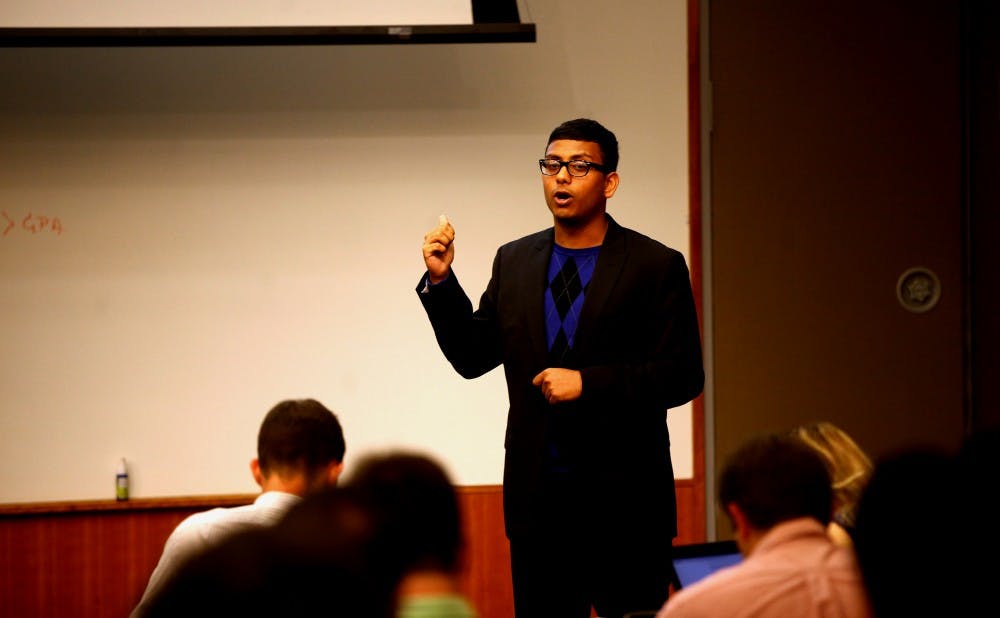The Duke Student Government Senate passed a resolution to encourage evaluation of Duke's new LGBTQ-inclusive application question—a different one than DSG had previously proposed—at their meeting Wednesday.
The resolution—co-sponsored by senior Daniel Kort, DSG director of LGBTQ affairs and policy and president of Blue Devils United and junior Keizra Mecklai, vice president of equity and outreach—recommends that the University establish a committee to evaluate the effectiveness of the new application question during the admission year of 2014-15.
The concern about the effectiveness of this year’s application question mainly stems from the fact that all factors mentioned in the Duke nondiscrimination statement appeared in the form of checkboxes—except for sexual orientation and gender identity, Kort explained during his presentation.
“LGBTQ prospective students have to write a 250-word essay explaining their sexual orientation and gender identity, while other identities can be marked by checking a box,” Kort said.
The resolution recommends that the representatives on the committee come from Blue Devils United, the Office of Student Affairs, the Office for Institutional Equity, Duke Student Government, the Office of Undergraduate Admissions and the Office of the Provost. If the committee determines that the new question is not effective toward meeting the needs of LGBTQ prospective students, the committee should recommend to the Office of Undergraduate Admissions other possible means of LGBTQ inclusivity in application questions.
Last year, DSG passed a resolution sponsored by Jacob Tobia, Trinity '14 and former vice president for equity and outreach, that pressed for the addition of a LGBTQ-inclusive question on college applications. Following the passage of Tobia’s resolution, Kort—in collaboration with Janie Long, former director of Duke's Center for Sexual and Gender Diversity—proposed a checkbox that would allow applicants to identify their sexual identity as female, male, intersex, transsexual or other, and their sexual orientation as heterosexual, gay, lesbian, bisexual, pansexual, queer, questioning or other.
The proposed checkboxes would appear alongside a statement from the University stating that “the following optional questions help us to better understand our applicant pool and facilitate the connection between diversity resources on campus and the students whom they serve.”
The proposed format was not accepted and the new application instead includes Duke’s optional 250-word prompt that encourages students to "share a perspective you bring or experiences you’ve had to help us understand you better" such as a community they belong to or their sexual orientation or gender identity.
Kort said that the main goals of the resolution are to make sure that applicants are well-connected and well-aware of campus resources for LGBTQ students, to track the admission statistics of LGBTQ students and to fulfill the mission toward LGBTQ equity by treating sexual and gender identity on par with other non-discriminatory identity markers such as race.
“Sexual orientation and gender identity should not be treated different from the other identity markers,” Mecklai said.
The Senate also passed a statute creating a research unit—which will operate independently of DSG—to take on specific projects requested by DSG and consists of a director and a steering committee. The unit will aid DSG in their policy making by using quantitative data in the process. Executive Vice President Abhi Sanka, a junior, noted that data-driven people will lead and work in the unit to conduct student-initiated studies about campus issues.
“[DSGRU will] harness the power of statistics to answer some of our most pressing campus issues,” Sanka said during his presentation.
Sanka added that the new unit will bring in a different type of Duke student who possesses a unique set of skills and that the research unit will be accessible despite being independent of DSG.
After DSG seeks counsel from the research unit on a specific project, the research unit will have one semester to develop and present study methods to approach the issue. Once DSG approves the methods, DSGRU will carry out their implementation the following semester and ultimately report on their findings.
“The goal of this unit is to study campus and have the credibility of Duke Student Government behind them,” Sanka said.
In other business:
The DSG cabinet for 2014-15 was sworn in at the meeting.
The Senate passed a budgetary statute to reduce DSG's newspaper budget. The newspaper program provides access to several newspapers free of charge for students. According to the statute, the budget will be reduced by $6,500, which will be allocated instead to support the programming fund.
Duke Student Organization Finance Committee also presented on their early funding plan for the week, which includes the funding of a concert hosted by Kappa Phi Lambda to promote Asian cultural diversity.
Correction: In an earlier version of this article, the legislation that created DSGRU was referred to as a resolution. It was a statute. The Chronicle regrets the error.
Get The Chronicle straight to your inbox
Signup for our weekly newsletter. Cancel at any time.

